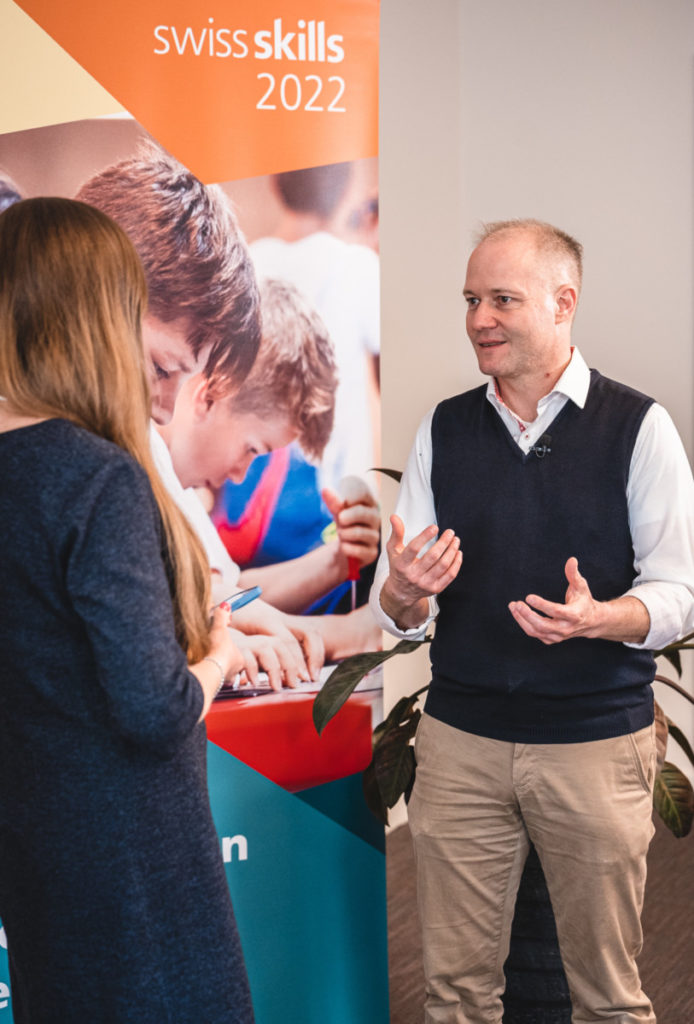Over 60 percent of young adults in Switzerland choose vocational training or apprenticeship over an academic path. This is an important economic factor that affects a country’s competitiveness in terms of the labour market and low unemployment rate, which in Switzerland is at about 4 percent.
SwissSkills is an agency focused on promoting the vocational education system in Switzerland. Its goal is to demonstrate the benefits of apprenticeship in Switzerland and to showcase a wide range of professions to young people who are interested in pursuing a career path that enables on-the-job learning.
SwissSkills organises a biannual event which will take place this year from 7 to 11 September at the Bern Expo in Bern. The experiential event format will showcase 150 professions and will allow attendees to engage directly with the employers and ask questions of current apprentices in the programmes.
Vocational training is common in many countries around the world. The EuroSkills and WorldSkills events are two global events in which young people compete to showcase their skills and win gold medals for their countries. These events are important to promote the variety of career paths available to young adults and also to support them in identifying and integrating the new skills required by the job market today, such as digital skills.
I interviewed André Burri, General Manager of SwissSkills, about the event this year and the uniqueness of the vocational training and apprenticeship system in Switzerland. We also discussed why Bern is the perfect destination to host an event of such scale and importance.

The vocational education and training system in Switzerland is unique in the world
What makes the Swiss vocational education training system unique in the world is that participants spend 80% of their time working directly in a company and the other 20% in school. As a result, most of the opportunities for innovation occur directly where they work. Another advantage is that the young adults 16–17 years of age are being paid by a company for their work. This makes this path very attractive for young people to progress rapidly in their career journey.
Furthermore, the vocational education and training system is flexible; young adults can take part in an apprenticeship and still have the opportunity later to pursue a PhD, which is not an option in most other countries. Nearly 50 percent of the young adults who start an apprenticeship in Switzerland obtains a post-graduate degree. As a result, the students continue to gain valuable knowledge which further contributes to the economic success of Switzerland.
New elements will be introduced this year at SwissSkills
First launched in 2014, the SwissSkills event is constantly evolving. This year after a three-year COVID break which ushered in a digital transformation of the event, there will be new professions to see and experience.
Digital business development, a hybrid of classical commercial apprenticeship and digital knowledge, is one of the new in-demand professions created because of digitalisation. Another profession being highlighted this year is entrepreneurship, for which a new skill competition will be held where people from two different skill areas will team up to commercialise a new business idea. There will also be professions related to cybersecurity and cloud computing, which are both in high demand because of the digital movement.

Why was Bern selected as a host city?
Switzerland has four language regions: French, German, Romansch, and Italian. When organising an event in Switzerland, it is necessary to consider that it takes place somewhere in the middle of the language regions. Bern is a region in which both French and German are spoken, which is one of the reasons why the event takes place in Bern.
In addition, Bern is the capital city which makes it an ideal place to host championships that are part of the SwissSkills event.
Furthermore, in terms of logistics, the Bern Expo has the capacity and infrastructure to accommodate this scale of event, which spreads over 100,000 square metres at the venue. Nearly 800 working stations showcase the 150 professions, and as many as 32,000 people daily will be walking around the venue.
Lastly, the event has received significant support from the city of Bern in the past, where the event has been held every year since its launch in 2014.

How does the Bern Convention Bureau support the event?
Since the first event in 2014, the role of the Bern Convention Bureau has evolved, particularly in how they support the event. In the initial pitching phase, the Bern Convention Bureau played an instrumental role in winning the bid to host the event in Bern.
Since then, the event has grown and there are more stakeholders involved; international delegations and associations come to visit the event and the city. Currently, the Bern Convention Bureau is responsible for organising activities that are not part of the main SwissSkills event. It also manages hotel bookings and side programmes for the various stakeholders.

The SwissSkills event targets a young audience. What considerations go into designing an event for young demographics?
The event has two main target groups: young people and their parents. To reach the parent audience, the event uses traditional commercials on TV and radio. The competitors come from about 800 different villages and cities in Switzerland; every region has its local media (newspapers, radio) that are going to broadcast their participation.
Young people in Switzerland take this topic very seriously because it is a significant decision for their future. The organisers created vlogs and livestreams as suitable channels to communicate this important content. During the event itself, the entire program is live and in-person. Virtual and hybrid event options were considered, but the organisers decided against it because virtual content might detract from the live experience which they come to see and experience. After the event, all the information about what took place during the event will be made available.
How is the impact and success of the event being measured?
One measurement of success of the event is the number of Swiss inhabitants that the event promotion reached, and whether the target audience was reached.
Another measurement of impact is the revenue generated for the city itself, which is typically about 32 million CHF back to the city and the region.
Lastly, organisers track the trend in the number of Swiss people who take apprenticeships, which is approximately 66%, with the goal to increase this number. It is important to communicate to young adults and parents that an apprenticeship should be seen as similar to an academic course, and that in Switzerland it doesn’t matter whether a person first takes the academic path and completes a bachelor’s degree or takes an apprenticeship. They can still have a chance to pursue a higher education later. The goal of SwissSkills is to reach 70 percent of Swiss people taking an apprenticeship by the end of 2030.
Future vision for Swiss Skills
One vision for SwissSkills is to implement new skills areas, which will be added this year with the digital skills. Adding new skill areas requires additional space at the venue, however, Bern Expo is expanding its fairgrounds with a new hall, planned to be complete in 2024 with new event space.
Furthermore, new competition ideas are under consideration to demonstrate how a profession will look in 10–15 years.
Another vision is to foster more interdisciplinary group work to see how the groups come up with different solutions, all of them different but still correct.
A final vision is to bring the WorldSkills event to Switzerland once to make the Swiss knowledge visible on an international stage and attract the large number of visitors to Switzerland.
How can vocational education and training on the international scale be measured?
Despite discussions on creating a standard measurement like the Programme for International Student Assessment (PISA), it is difficult to measure the success of vocational education programmes on an international scale, partly due to the varying social and economic background of each country. A metric that can be measured is the participation levels in vocation education programmes in every country and the percentage of young people that find a job after the programme. In looking at these parameters, it is possible to see that the system is working, young people are employed, and the economy is strengthened which can lead to a brighter future for young people.
Conclusions
This is an event that can shape the new generation of young adults and play a fundamental role in the health of a country’s future economy.
The past two years have demonstrated that in order to remain competitive in the job market it is necessary to maintain and gain new skills, and also to collaborate. This interview showcased the importance of cross-industry and interdisciplinary collaboration to develop new products and services. It also highlighted the growing focus on digital skills, which will only increase in the future.
Lastly, I hope SwissSkills will have the chance to bring the WorldSkills event to Switzerland. An event of such a scale will bring significant economic and social benefits to the region and will contribute to a lasting legacy for Bern.
Sponsored post. In collaboration with Bern Convention Bureau.





No Comments